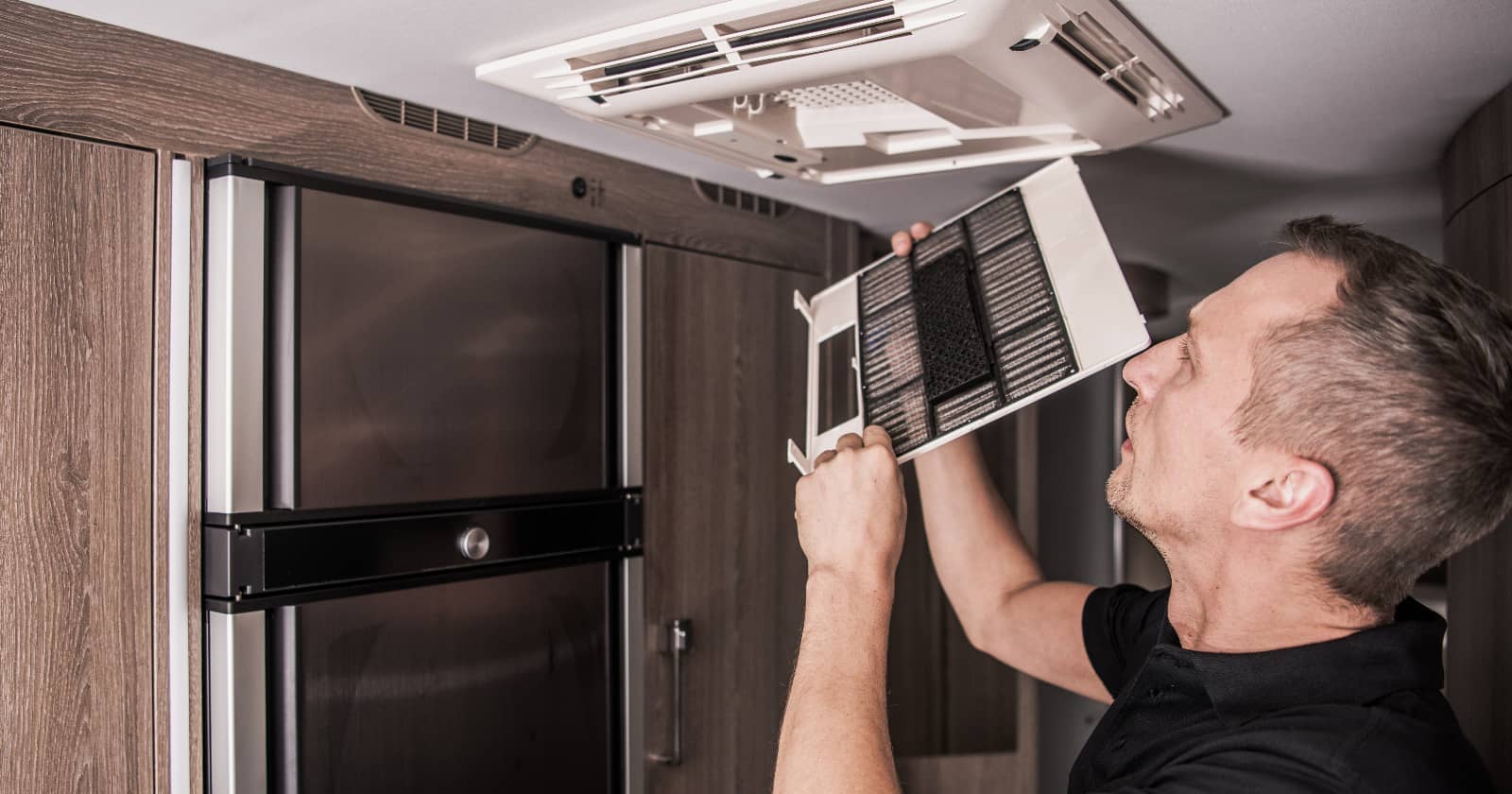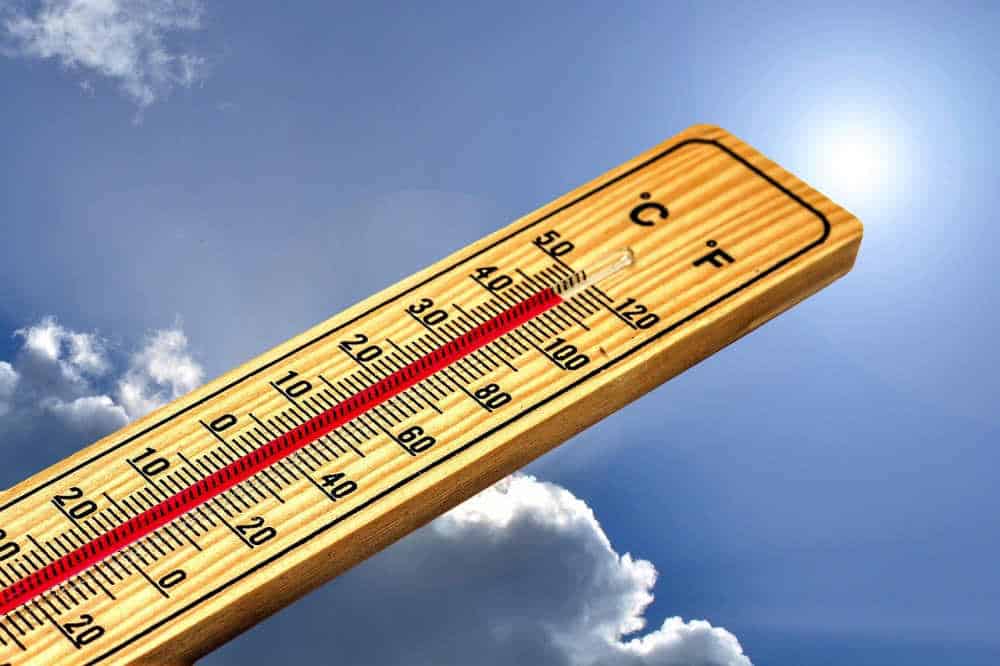Many RV owners wonder about the benefits of RV heat pumps versus RV furnace heat. How does an RV heat pump work? How is it different from a furnace? Is one more efficient than the other? How do you maintain a heat pump? When is the best use of a heat pump instead of a furnace, and vice versa? And should you add one to your RV if you don’t already have one installed?
If you’re trying to make the right heating choice for your RV, this article is for you! Keep reading to learn how RV heat pumps also work as air conditioners, just by transferring warm air in or out of the RV, depending on the season. And, you will also discover why an RV furnace works better in extreme cold, simply because it relies on a fuel source instead of the outside air to keep you warm in the camper.
Odds are you already own a heat pump.
Most of you reading this article already own a heat pump or two without even knowing so (especially if you are a homeowner). Compressor refrigerators, freezers, and air conditioners are all a type of heat pump. These appliances transfer (pump) heat from one location to another. A refrigerator / freezer pumps heat from the inside of the box to the outside.
An air conditioner does the same thing by pumping heat from the inside of your home or camper to the outside. Once the heat has been removed you are left with “cold”* air. If you have ever felt the warm air being discharged (transferred) by one of the appliances mentioned above, you will quickly understand how a heat pump works. This same process of transferring thermal energy can be used to heat a home or create a warm RV.
Still confused about how RV heat pumps work? Just remember; there no such thing as cold, only the absence of heat. RV heat pumps simply move hot air in or out of an RV or home, depending on the need.
Just as there are the pros and cons of an RV propane heater vs electric heater, there are also pros and cons of a heat pump versus an RV furnace. Let’s review them.
FAQs on RV Heat Pumps and RV Furnace Systems
First, an RV heat pump and an RV propane furnace are both heating systems commonly found in RVs. But they operate differently. Each has their own advantages and disadvantages in cold temperatures and hot summer weather. Let’s compare the operations between an RV heat pump versus an RV furnace.
How does a heat pump work?
A heat pump works by transferring heat from one place to another using refrigerant and a compressor.
- In heating mode, it extracts heat from the outside air. Keep in mind that even in cold weather,* there is still heat energy in the air. Then it transfers the warm air into the entire RV.
- In cooling mode, a heat pump operates as an air conditioner. It removes heat from inside the RV and transfers it outside.
How is it different from an RV propane furnace?
An RV furnace works by generating a lot of heat, by burning propane to produce it.
- Using a 12-volt fan, the RV furnace then distributes this heat throughout the RV via ducts or vents.
- While distributing the heat, the furnace simultaneously sends the combustion byproducts outside of the motorhome or trailer.
What is more efficient: RV heat pump or RV furnace?
Heat pumps are not designed to work in “cold” weather they generally stop working between 36* and 38*. Below that there isn’t enough heat in the outside air to be transferred through the system into the living area. That’s when most start to frost over and lock out. There is no absolute lockout temperature. Some lockout as high as 40* while others will work down to 34*. Each unit is slightly different.
RV Heat Pump versus Furnace, @Hikerdogs, iRV2 Forums Member
What’s the Best Way to Maintain an RV Heat Pump or RV Furnace?
Both RV heat pumps and RV furnaces require regular rig maintenance to ensure optimal performance. This includes cleaning or replacing filters (if so equipped), cleaning the evaporator and condenser fins, and checking for any leaks or blockages in ducts/vents.
What is the advantage of using an RV heat pump instead of an RV furnace, and vice versa?
- RV heat pumps are generally more suitable for mild to moderate climates with minimal odds of freezing temps in winter. They can be less expensive to operate in these conditions.
- RV furnaces are better suited for cold climates where temperatures frequently drop below freezing, as they can provide reliable heat even in extreme cold*.
Should you add a heat pump to your coach if you don’t already have one installed?
Whether you should add a heat pump to your RV depends on your specific needs and travel habits.
It’s also essential to consider factors such as initial cost, operating costs, climate conditions, and your personal comfort preferences when making this decision.
When considering a heat pump for your RV you will notice that they are also designed to operate as air conditioners too. As described earlier, turning an RV heat pump into an air conditioner is achieved by reversing the process of the heat pump. It goes from either transferring hot air from the inside of the RV to the outside, OR transferring heat from the outside into the interior of the RV.
RV Heat Pump and Air Conditioners to Consider.
RecPro – RV Air Conditioner 15K Quiet AC Unit with Heat Pump, Remote Control
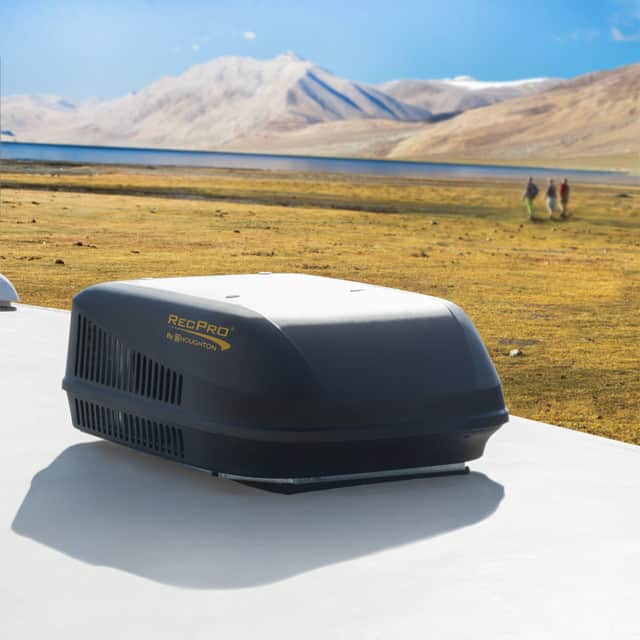
Heating and cooling capacity – Keep your temperature regulated with the RecPro RV AC unit! Whether you’re in need of a cool summer breeze or a warm winter escape, the RecPro can be adjusted to whatever temperature you desire. Plus, the directional tube ensures optimal air quality and cleanliness. Comes with removable screen filters that can be cleaned and replaced.
Pioneer® 9,000 BTU Under-Bench RV Heat Pump Air Conditioner, 110/120V
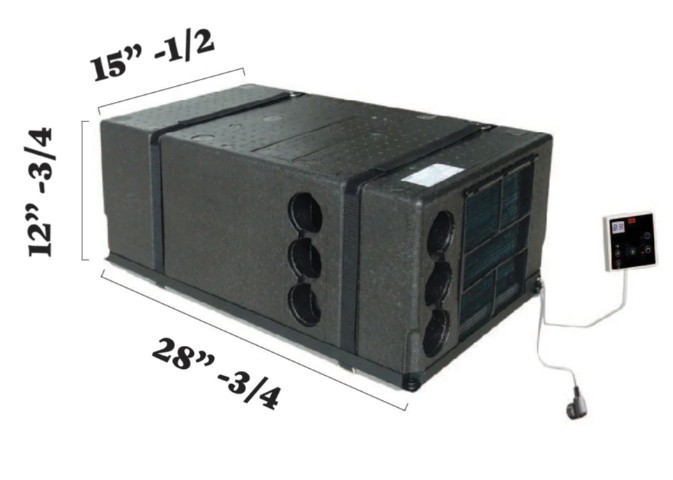
Explore the great open road with Pioneer’s newest RV heat pump air conditioner. Intended for under-the-bench installations, this low-profile and highly durable package system will keep your RV at a cozy temperature all year round and do so quietly. Easily attach three ducts to serve separate areas of the RV with options to connect to the front or side of the system. Control the system using the wall-fixed thermostat, or from the comfort of your bed using the convenient handheld remote controller. With ultra-quiet performance, sleek design, and very low input power requirements, this rugged plug-in system will be one of your favorite companions on those long-haul journeys, day-in and day-out.
Dometic Brisk II – 15K BTU Single Zone Air Conditioner with Heat Pump
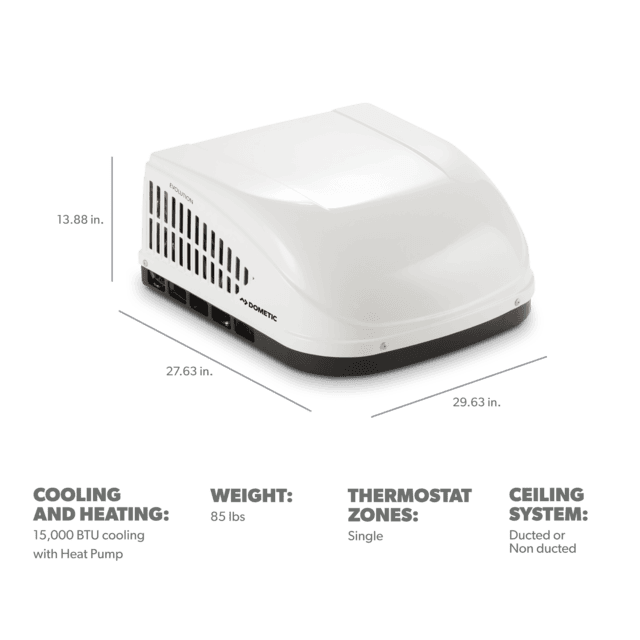
Enjoy a high performance design by Dometic. The Brisk 15K BTU with heat pump offers larger air openings for improved air flow and cooling. Take it on the road for all weather conditions.
RV Heat Pump vs. RV Furnace: Which One is Right for You?
Only you can decide which RV heating system is right for you as there are many variables involved. Hopefully my short tutorial has provided you with sufficient information to make an informed decision.

